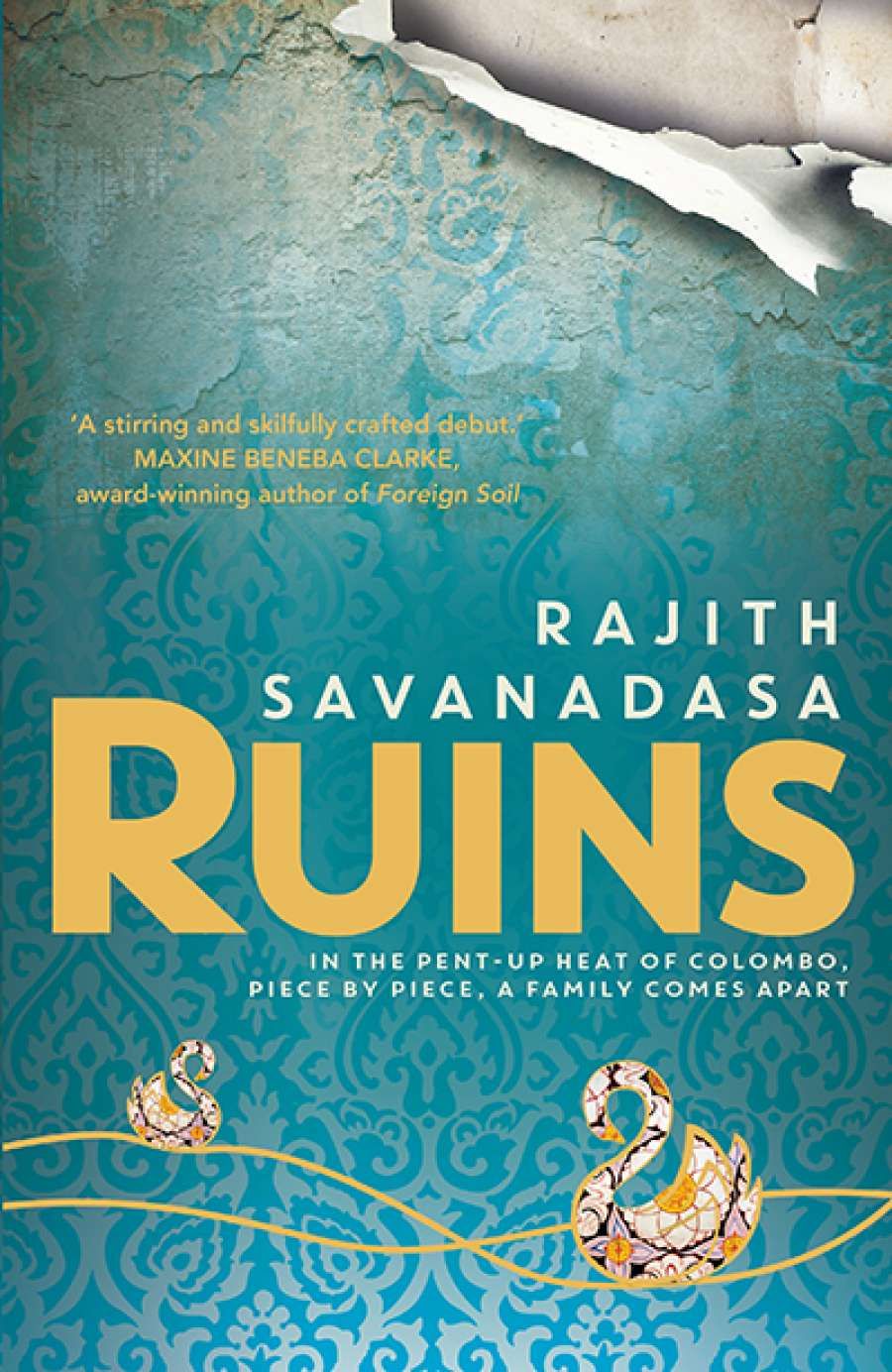
- Free Article: No
- Contents Category: Fiction
- Custom Article Title: Claudia Hyles reviews 'Ruins' by Rajith Savanadasa
- Custom Highlight Text:
Ruins is the impressive début novel of Rajith Savanadasa, born in Sri Lanka and now living in Melbourne. He is founder and primary contributor to Open City Stories, a website ...
- Book 1 Title: Ruins
- Book 1 Biblio: Hachette $27.99 pb, 343 pp, 9780733635052
Mano is the Sinhalese editor of a failing English-language newspaper. Office standards have slipped, as have sales, and Mano has sunk into despondency, reduced to toeing the line and printing safe things 'fed to us by the ministries'. He sanitises stories to avoid the wrath of the powerful. Although Mano sees little fault in himself, 'peacetime editorial' leaves him 'unsettled' and 'disoriented', and his workplace gloom invades his home life as a new and hopeful Sri Lanka begins to emerge.
Home life is a microcosmic combat zone. Lakshmi, Mano's Tamil wife, radiates ill-temper and distraction bordering on mania. She appreciates the sacrifices Mano has made in their mixed marriage, but the war has overwhelmed her domestic world. A Tamil in Australia contacts her by email and asks her to find a beggar boy from her home town. His father, a poor fisherman, has found asylum in Australia and wants to be reunited with his son. Lakshmi becomes obsessed with finding the boy, conflating him with another lost child, her son Niranjan, whom she finds hard to understand when he returns from Sydney with a degree from UTS and a taste for a different kind of life.
Lakshmi's nagging drives Niranjan from the house to a smart flat. His teenage sister Anoushka believes his departure is her fault. Anoushka feels misunderstood by all and is treated like a baby. This is of course not an unusual situation, and her parents would definitely have tried most daughters, but she is particularly unpleasant and rude. Against the odds, her O-Levels results are brilliant. But, pressured beyond all limits, she reacts violently.
While rather wallowing in their own ruinous unhappiness, the four family members exhibit great selfishness. The fifth voice is different. Latha, the household's servant who, with benign tolerance, considers her family to be 'good people'. Abandoned by her own parents, she is grateful to have accumulated enough pinn, or merit, to have earned such surrogates. Whilst not physically abusive, the behaviour of the family towards Latha is contemptible. They criticise her cooking and cleaning, begrudge her the tiniest boon of a telephone call, and generally treat her as a half-witted and expendable slave.
Subterfuge pervades the book and one insidious consequence of the war is that people lose basic trust. Colleagues might be informers, anonymous phone calls could mean the phone is tapped, recognition by a soldier at a checkpoint could result in being put 'in a white van' and disappearing. Mano hides his arrack from the family and becomes a voyeur, stalking an old office friend; Anoushka manufactures alibis, covering her tracks in a quest for punk rock music and a cool image, Lakshmi makes clandestine visits to an astrologer. Phrases and short conversations in untranslated Sinhala add to the veil of secrecy.
Latha receives news that her nephew Kumara, a soldier, has died on the battlefield. 'Bad karma' thinks Latha: first Niranjan has an accident, then a goldfish dies (not as absurd as it sounds), then Kumara. Grudgingly, Mano grants her leave for the funeral. 'We will have to buy lunch and dinner for a week,' he notes before deciding that the family will take a holiday and drive Latha to her village. On the way they stop to inspect some thirteenth-century ruins, palaces and military strongholds built against foreign invaders. At the base of a staircase, Mano finds a sandakada pahana or moonstone, a semi-circular carved stone representing the Buddhist wheel of life. Desire, he says, is the cause of pain in this never-ending cycle.
 Rajith Savandasa (photograph by Craig Peihopa)
Rajith Savandasa (photograph by Craig Peihopa)
Latha, overcome by grief and confusion, leaves the funeral and experiences a kind of transfiguration. She finds 'the story of the moonstone is everywhere and nowhere'. She recognises the futility of her search for something tangible which presents a kind of truth reinforcing the Buddhist view that the primary purpose of life is to end the cycle of suffering.
There is much to consider in Ruins and many issues have contemporary relevance. There are no devastating images, as in Michelle de Kretser's Questions of Travel (2012) or Michael Ondaatje's Anil's Ghost (2000), but in depicting what seems like an ordinary family, Savanadasa suggests unbearable tensions and imaginings. An Author's Note states that the novel's structure is loosely based on the symbolism of the moonstone, and drawings of it mark the start and end of the text. He says the moonstone is no longer a simple analogy mapping 'myth, experience or history but a space to project one's own meaning'.


Comments powered by CComment